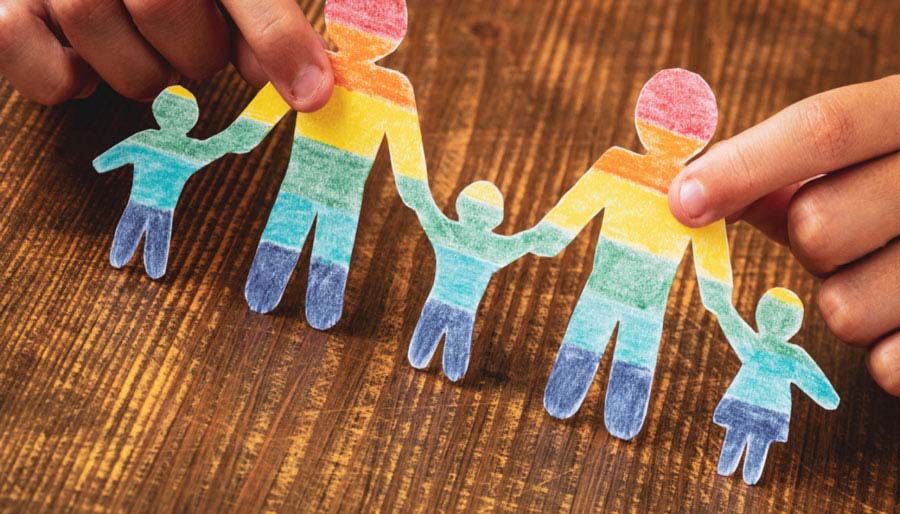Co-Parenting & LGBTQ+

Co-Parenting & LGBTQ+
Co-parenting can be difficult to navigate, whether within a heterosexual setting or within the LGBTQ+ community. Co-parenting, is defined as two people, who whether in a relationship with each other or not, have agreed to raise a child together.
Within the LGBTQ+ community, this definition is slightly more complex. In this sense, co-parenting is when people agree to conceive and raise a child together, despite not being in a relationship with each other. In this setting, a family can involve two, three or four people, and will include two legal parents, but an unlimited number of parental figures.
What is Parental Responsibility?
PR is defined as “all the rights, duties, powers, responsibilities and authority which by law a parent of a child has in relation to the child and his property”. These responsibilities are connected, and each parent has an obligation to meet the welfare needs of his or her children.
Why chose co-parenting for LGBTQ+ people:
Co-parenting is safe and easier way of parenting, without the application forms involved in adoption or laws surrounding surrogacy. Co-parenting provides the option of raising children outside of a relationship with someone you trust and want to conceive naturally with. Most people chose a person they are close to, which provides a trusted setting and a personal option.
Who to co-parent with?
Most people in LGBTQ+ relationships will decide to co-parent with close friends or even ex-partners. There are 4 co-parenting models for LGBTQ+ people:
- Two men in a relationship co-parent with a woman,
If a single woman uses the sperm of a man in a same-sex relationship, the birth mother and the sperm donor will become the child’s legal parents. The man’s partner (the non-legal parent) will need to apply for parental responsibility. If the same-sex couple not married, they can apply for a joint residence order, which will give the unrelated partner equal parental responsibility.
- Two women in a relationship who co-parent with a man,
Things are slightly more complicated here. If a same-sex female couple is unmarried and the child is not conceived in a fertility clinic, then the birth mother and the sperm donor will become the child’s legal parents. The mother’s partner will need to apply for parental responsibility.
If the same-sex couple are married, or in a civil partnership, the Human Fertilisation and Embryology Act 2008 states that the two women will become the child’s legal parents. The co-parent who donated the sperm will not be a legal parent, but can apply for parental responsibility.
If the child is conceived through IVF in a fertility clinic, then the three co-parenting adults will decide between them who the second legal parent will be, alongside the birth mother. All three parents can have parental responsibility.
- Two same-sex couples who co-parent together, and
In the UK, a child can legally only have two parents. For same-sex couples who wish to co-parent, important decisions will need to be made as to who will be the birth mother, and who will be the sperm donor. If the child is conceived at home, the sperm donor and the birth mother will be the legal parents.
If the birth mother is married or in a civil partnership with her partner, then they will become the legal second parent, despite the other co-parent donating the sperm.
If the child in conceived in a fertility clinic, all adults will normally be able to choose who the second legal parent will be, alongside the birth mother. The two parents who are not the legal parents can apply for parental responsibility.
- Two single LGBTQ+ people who co-parent together.
Single people may co-parent with another single person to raise a child and not be in a relationship with each other. A gay man and a lesbian woman can come together and conceive a child through IVF. Both will be registered as the legal parents on the child’s birth certificate and share parental responsibility.
In the event either parent finds a new partner, you can agree how much time this person spends with your child, this person can apply for parental responsibility if this is what you decide and agree on.
The position of the Non-legal parent:
Unless a parent is named on the child’s birth certificate, they are not the legal parent of the child, in the UK, a child can only have two legal parents. Where a third person is neither biologically related to the child nor has parental responsibility, they have no legal duties towards them, until they apply for parental responsibility.
The non-legal parent(s) can apply to the court for a child arrangements order, or sign a legal agreement that gives them parental responsibility. Where agreements cannot be reached as to who should have parental responsibility, you may need to speak to a specialist lawyer or mediator.
Speak to our Family Law experts
For more information on parental responsibility, applying for this or making applications to the court, speak to our specialist Children Law team on 01895 207882 or email Sonal Parekh on sonal.parekh@ibblaw.co.uk.
